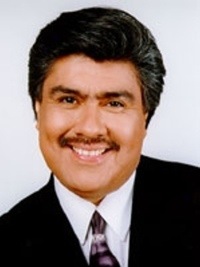Jesus Javier, Spanish TV News Pioneer, QEPD
 The last time I spoke to Jesus Javier was about two months ago. It was one of those out of the blue calls that took me by surprise and sent me back to a time filled with possibilities. We had a long conversation — there was a lot to catch up — and somewhere in between he asked if I’d be interested in moving to Burbank, he was looking for a news director. Truth is that I hadn’t spoken to him in years. I had kept up through mutual friends and colleagues; knew he was back in California, but I had known that since 1989, the last time I actually saw him.
The last time I spoke to Jesus Javier was about two months ago. It was one of those out of the blue calls that took me by surprise and sent me back to a time filled with possibilities. We had a long conversation — there was a lot to catch up — and somewhere in between he asked if I’d be interested in moving to Burbank, he was looking for a news director. Truth is that I hadn’t spoken to him in years. I had kept up through mutual friends and colleagues; knew he was back in California, but I had known that since 1989, the last time I actually saw him.
It was through a mutual friend that I found out he had died.
The news didn’t come easy. I considered him a friend and I will always be in his debt. In order to explain I have to go back to 1984 — it sounds like a lifetime ago, but in fact it’s been several lifetimes, a lot can happen several times over in almost 30 years. I was 23 years old and recently returned to San Antonio, Texas. I was looking for a job and had some experience in TV news — I’d spent about two years reporting, editing and anchoring at a CBS affiliate in Laredo, Texas.
I was young and filled with the usual take-no-prisoners youthful exuberance. I’m pretty sure I sauntered into KWEX-TV, the first Spanish language television station in the United States, and asked for a job. Back then KWEX was part of the Spanish International Network, the precursor to what is now the Univision Television behemoth. I offered my services as a reporter and was given a polite “We’ll call you.”
About a week or two later I was sitting in front of Jesus Javier. What I remember from that day held true through to the last time we spoke. He was a disarmingly soft spoken man, intelligent to an extreme and quick to laugh. He hired me — but not as a reporter. I was to carry a video camera on one shoulder and a recording deck strapped to the other, shooting news for the local channel 41 newscast. Those were hard-scrabble days when everyone in the newsroom smoked (a cloud always hung over the workstations), cursed freely and kept a bottle of hard liquor in their desk drawer. The work of putting a daily 30 minute newscast together was a controlled chaos — I felt easily at home and Jesus held court in the calm center of the storm. He was the kind of boss that kept you on your toes out of a fear of letting him down. He never kept praise to himself and his reprimands were swift — in his soft spoken manner he’d say “You messed up, try not to do that again.”
Jesus taught me how to tell community stories that mattered. Those were the days when we were still laying the groundwork of Spanish TV news, the Nielsen ratings company didn’t acknowledge our existence, our sales team counted viewers by counting UHF antennae on the rooftops on the west and south sides of San Antonio.
I’m pretty sure I pestered Jesus to give me an opportunity to be a reporter, but he held back because he didn’t believe my Spanish was good enough for broadcast. That was the motivation I needed to go back to school and finish my degree in Spanish literature. I owe that to him. And with the diploma in hand he gave me my shot. I owe that to him as well. In the years since I became, once again an in a second language, an editor and anchor and eventually moved to the rival Telemundo network where I was news director for 10 years. I like to think I patterned my news management style after several of the journalists who I call boss. Jesus Javier was at the top of that list.
I’m well aware of his many accomplishments — he was a top reporter and anchor in Los Angeles as well as a successful news executive. But my memory of him is of a man who always seemed a little ahead of the rest. He was a U.C. Berkeley trained electrical engineer and he approached news in a calm, logical and specific manner. I learned to analyze news by listening to him. I imagine he faced his battle with cancer in the same soft spoken, logical way. That’s how I’ll remember him, analyzing the news, complaining about the fixer-upper house he’d bought on Agarita Street and that he never finished fixing-up. The picture on this post is the picture I’ll keep in my mind, it’s how he looked in the mid 1980s when news was about community and the stories we told were about people and their struggles.
The last time we spoke we talked about how it had all become about ratings and eyeballs and clicks and unique visitors and such. I’m sure I heard him smile when he said, “Don’t give up.”
Rest in peace friend.
[Photo Courtesy Estrella-TV]
